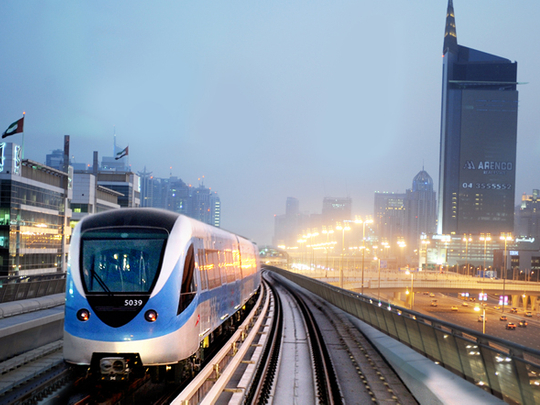
Dubai: Affordable housing is pretty much harder to find in the city centre, especially near a metro stop, than in residential communities farther away.
A previous research has shown that those who choose a car-free life and move within walking distance to Dubai’s mass transit system often end up paying a premium on accommodation, with apartment rents costing 10 per cent to 20 per cent more.
But if you choose to ditch your vehicle for the daily commute to the office, it would do well to do some house hunting. According to the latest research, it is still possible to find a flat near the Dubai Metro without necessarily creating a whole in the wallet.
Properties along the green line should be the top choice for the most budget-conscious. Based on the figures released by propertyfinder.ae on Wednesday, the cheapest one-bedroom flat that’s easily accessible by metro are those near the Stadium and Al Nahda stops, with rents averaging Dh52,000 a year.
The next most affordable should be the apartments near FGB station, with annual lease rates pegged at Dh54,000. This is a good option for those with offices along Shaikh Zayed Road, or in Jumeirah Lakes Towers, Dubai International Financial Centre, Karama and Bur Dubai, among others.
Outside the Dubai Airport Free Zone and Al Qusais stops, one-bedroom flats can be had for Dh56,500, while those near UAE Exchange (formerly Jebel Ali) and Danube stations can offer approximately Dh62,000 in annual rent.
Not far behind are the properties near Nakheel Harbour and Tower at Dh63,000 a year, as well as those within walking distance from Noor Bank station (Dh64,000), followed by Abu Hail, Al Qiyadah and Abu Baker Al Siddique – all for Dh65,000 on average.
A little bit farther away, and also along the red line, are apartments outside Ibn Battuta station, costing Dh69,000 a year. If you can still afford to spend a few thousand dirhams more, properties near Deira City Centre, as well as Gigico, Al Ras and Palm Deira, can cost Dh73,000 annually.
However, when securing a new tenancy contract or renewing an old one - whether for an apartment along the Dubai Metro or farther away - residents are advised to always negotiate for a lower rate.
Several market research reports have suggested that rents have fallen. This doesn’t guarantee, however, that every single tenant in the emirate will automatically get a reduction, as many landlords will still attempt to increase the rates in a bid to make more money.
“Our statistics do in fact show that rents across Dubai and the UAE are on the decline and have been for some time now. That does not mean, however, that your landlord won’t try to increase your rent if legally allowed to do so,” Lukman Hajje, CCO of propertyfinder Group, told Gulf News.
“If you have been enjoying below market rents for some time, then an increase in line with present conditions could well be justified but in the vast majority of cases, you should be able to negotiate a better rate. “
Those whose lease contracts are up for renewal must also watch out, since property owners have the tendency to increase the rate for existing tenants, knowing that nobody really wants to go through the hassle of moving houses.
“Landlords understand that the cost and hassle of moving will always weigh heavily on the mind of tenants, so some will try to sneak in a Dh5,000 to Dh10,000 increase even if the market is in decline.”
“Don't be fooled. If your lease is expiring soon, you should be seeking a reduction of 2 per cent to 5 per cent. But, as with any negotiation, to be effective you need to be willing to walk away, meaning you must be prepared to pack up and move if your landlord doesn't budge down or insists on an increase.”







